Travel is finally regaining traction two years into the pandemic, with Vaccinated Travel Lanes (VTLs) withstanding in the face of the latest coronavirus outbreaks. Countries like Sweden have even declared the pandemic over, while others no longer mandate mask-wearing or Antigen Rapid Testing (ART).
While the Covid-19 pandemic brought travel almost to a standstill in 2020 — costing the Global Tourism Industry an estimated $935 billion in one year alone — it seems travellers have taken the time out to rethink their modes and impacts of travel.
According to a study conducted by travel accommodation agency Booking.com, more than 4 in 5 of global travellers think sustainable travel is vital, with 3 in 5 saying the pandemic has made them want to travel more sustainably in the future.
Yet, almost half still believe that as of 2021, there were not enough sustainable travel options available, with more than half admitting they get annoyed if their place of accommodation prevents their sustainability practices — such as not having recycling facilities.
And travel-related businesses — including the hospitality, food and beverage, and travel industries — are following suit, going along with that demand closely.
“Sustainability is no longer an add-on, it’s risen the league table of priorities substantially,” Mr Martin Ferguson, Vice President of public affairs for American Express Business Travel told sustainability news site, Eco-Business. “I don’t foresee any set of circumstances where a majority of companies reduce their focus on sustainability…we’re beyond that. It’s so fundamental to business culture now.”
Tourism in Singapore is no exception — in the past two years alone, many companies have made significant strides in greening up places of interest, accommodations, and dining.
Here is a compiled traveller’s guide for the sustainable tourist in Singapore.
Travel: Getting here and getting around
1. Singapore Airlines (SIA)
In May 2021, the Singapore International Airlines Group — Singapore’s national airlines — announced its commitment to achieving net-zero carbon emissions by 2050.
The Group has been investing in more fuel-efficient aircraft such as the Airbus A350s and the Boeing 787s, which are about 30 percent more fuel-efficient than previous generation aircrafts, helping to reduce emissions.
Earlier this month (11 Feb), Singapore Airlines (SIA) and budget carrier Scoot announced that from the third quarter of 2022, all their aircrafts will begin using sustainable aviation fuel, which is made from used cooking oil and waste animal fats supplied by oil refining company Neste.
Individually, travellers are provided with the option to reduce their individual carbon footprint through the Carbon Offset Programme launched in June 2021. This will allow travellers on Singapore Airlines, Scoot, and even when they send parcels by SIA cargo to have the option of offsetting the individual emissions from their flights at a premium.
These premiums will be used to support high-quality carbon offsetting projects verified by third-party certification bodies like the Verified Carbon Standard Program and the Gold Standard. Patrons can choose between dedicated projects such as rainforest preservation, solar power, and indoor air pollution.
For more information on SIA’s sustainable travel initiatives, click here.
2. Slow Travel
Despite these many commendable strides, air travel and carbon offsetting remain not without flaws. Pursuant to teenage climate activist Greta Thunberg’s pledge to cease taking air flights altogether, “The Greta Effect” has followed, causing a global rethink about whether air travel is really necessary at times.
If you have time to spare and are travelling relatively short distances, slow travel might be something you want to look into. For example, if you’re travelling around Europe, you could take the Eurostar train instead of flying across countries, even if the prices are comparable.
When out and about in Singapore, you could opt for private hire transport — ride-hailing app Grab now offers to option for passengers to offset the carbon emissions of their rides at just an additional $0.10 — but with one of the best and most affordable public transport systems in the world, we doubt you’ll need it.
Advocates of slow travel also emphasise on the perk of discovering a city’s hidden gems — who knows what one might discover looking out the Mass Rapid Transit (MRT) window or walking on foot instead?
Accommodations
1. PARKROYAL COLLECTION on Pickering
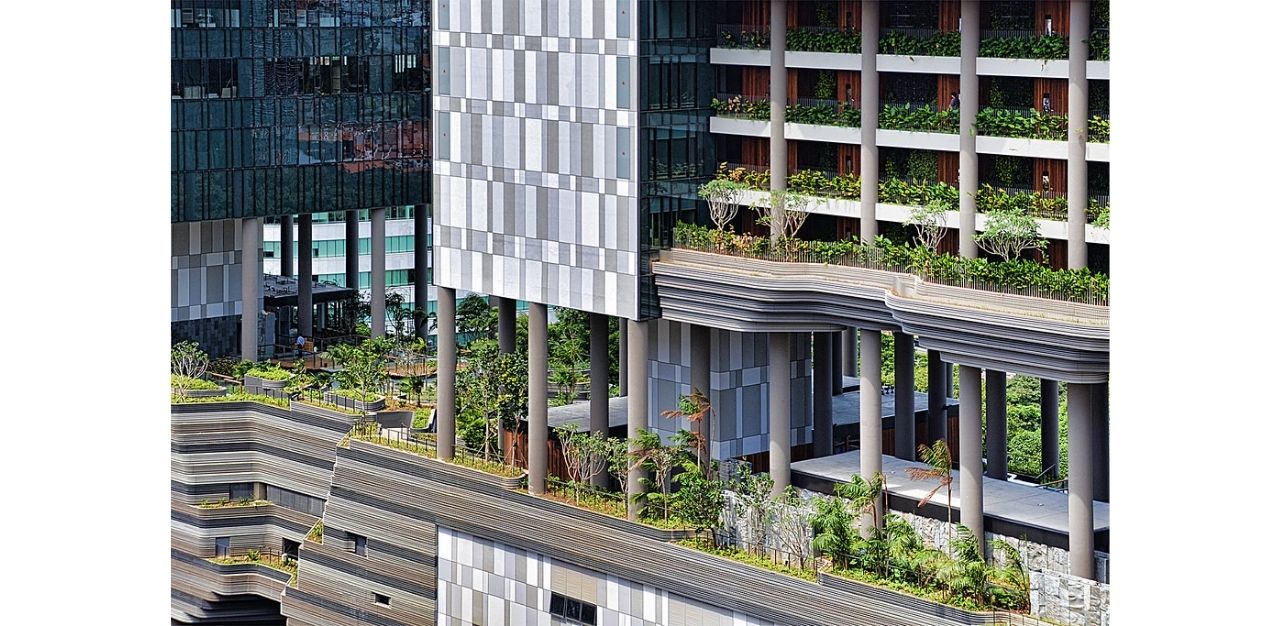
For five years in a row, this hotel-in-a-garden has held tightly to the title of Asia’s Leading Green hotel. Its extensive landscape features 50 different varieties of plants to create a 15,000 m2 lush tropical urban high-rise garden constituting more than 200 pe cent of the total land area. All of this is designed to be self-sustaining, with water usage minimised by rainwater harvesting.
Urban jungle exterior aside, the building employs a variety of cooling architectural feats, with its high-performance glass cutting out solar heat, yet maximising the intake of natural sunlight. Its roof terraces also insulate the upper storey from gaining direct heat, while serving as a recreational space for guests.
2. Grand Hyatt
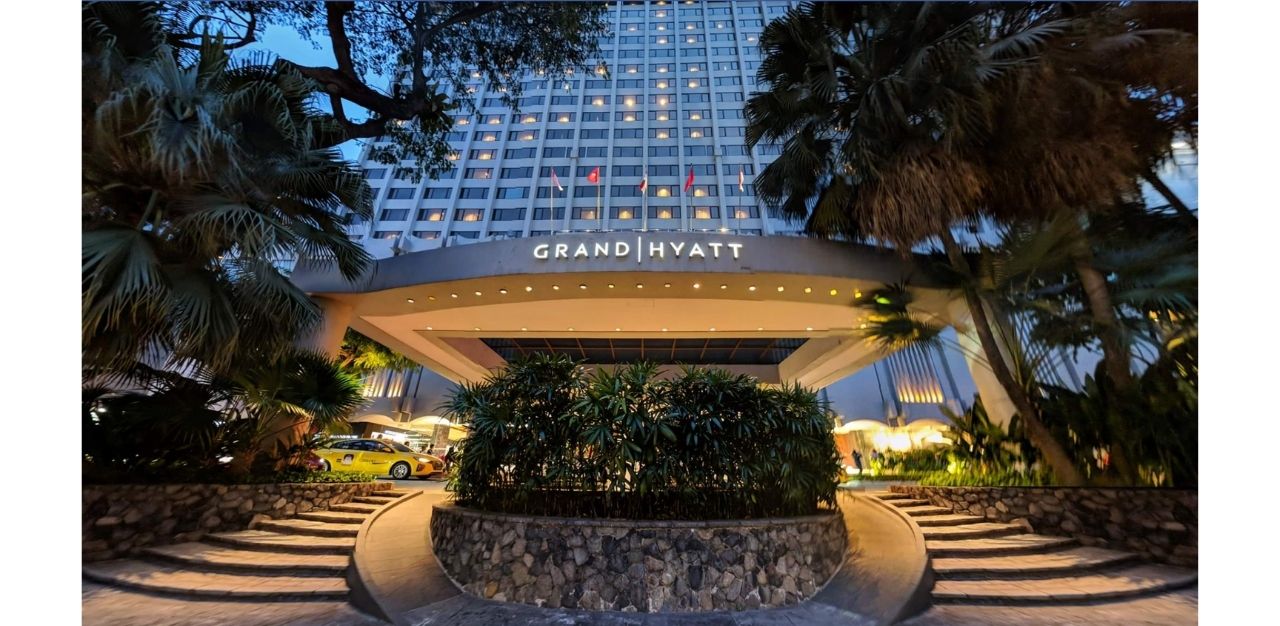
Located just outside the city’s most iconic shopping district, Orchard Road, the Grand Hyatt champions plant-based and vegan food options. Besides being the first to cater the Beyond Burger and JUST eggless eggs in Singapore, the hotel now has a longstanding partnership with social enterprise UglyFood to make orange juice out of blemished oranges that would otherwise be rejected by supermarkets and grocery stores.
With seafood certified sustainable by Marine Stewardship Council (MSC) and Aquaculture Stewardship Council (ASC), and local greens from Singapore’s urban farmers and Cameron Highlands in Malaysia, as well as herbs from the hotel’s very own rooftop garden, it’s an ethical foodie’s dream come true.
3. Marina Bay Sands
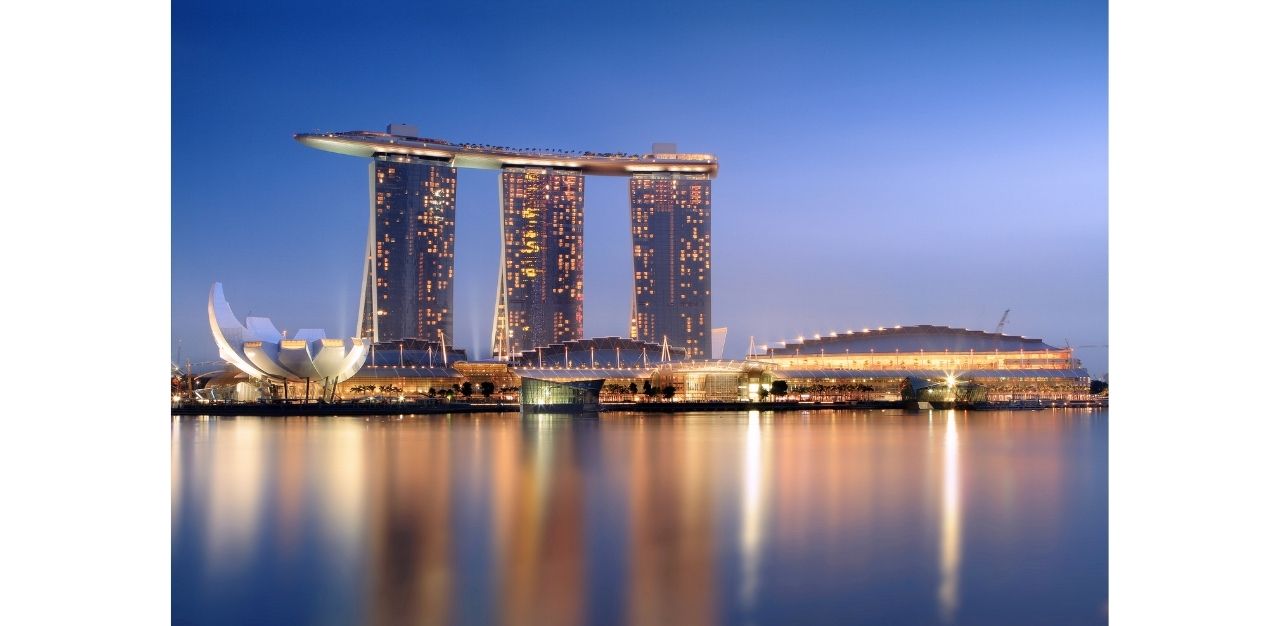
Despite being a globally-iconic luxury hotel, Marina Bay Sands does not skimp on its sustainability practices. The hotel employs an Intelligent Building Management System, which has automated control over lighting, heating, and water, for conservation purposes. For example, if guests have a window or door open, air conditioning will automatically be deactivated.
Since its conception in 2012, it has demonstrated a solid commitment to sustainability by reducing their carbon footprint by over 30 per cent, and as of 2020, have been deemed the first carbon-neutral MICE venue in Singapore.
Dining
1. Open Farm Community
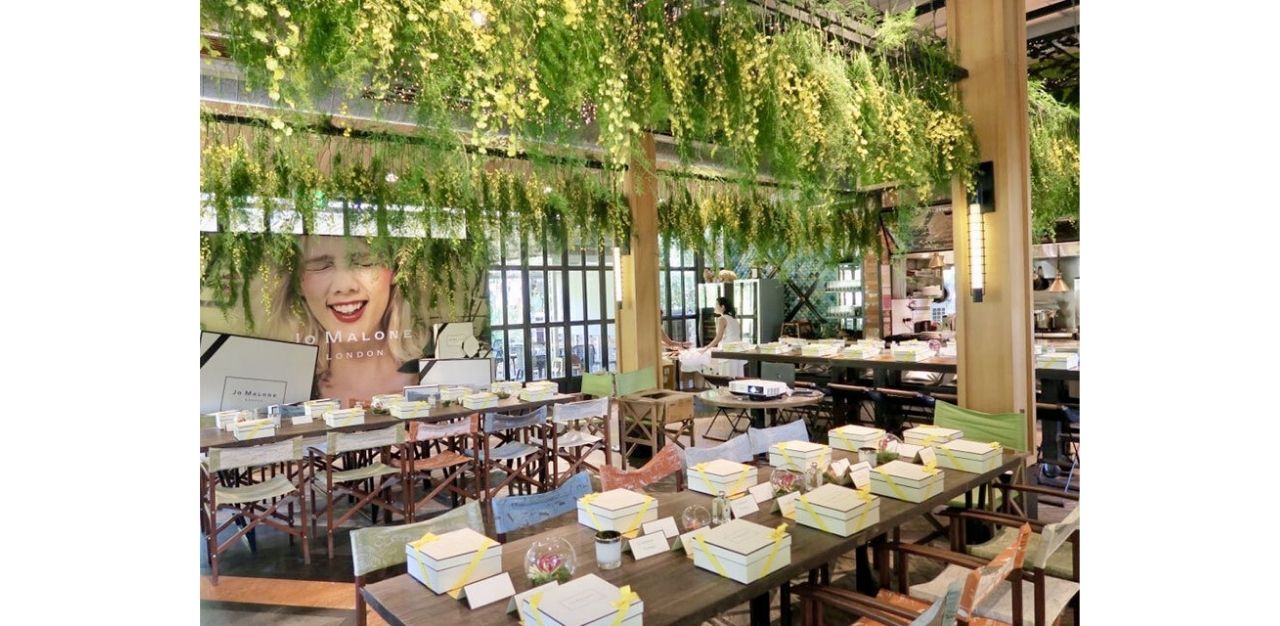
Pocketed in a little garden sanctuary along Holland Road, Open Farm Community is Singapore’s pioneer farm-to-table restaurant, championing the grow-your-own-food movement. Its on-site urban farm and garden give a seasonal harvest of herbs, fruits, and vegetables, resulting in an ever-changing menu that moves according to what nature has to offer at the time.
For any other foods the restaurant can’t produce on-site, it procures from the large network of local and Southeast Asian organic growers, such as locally-farmed chicken and biodynamic wines.
2. Scaled by Ah Hua Kelong
This one-of-a-kind seafood restaurant makes seafood as fresh — not to mention, sustainable — as it could possibly get. Co-owned by seasoned fisherman Ah Hua who spends most of his days in the kelongs and seafood farms on the coasts off of Singapore waters, the restaurant serves dishes made from the day’s catch.
The establishment offers a local take on classic dishes like fish and chips, pan-seared sea bass, and spaghetti — using native fish species instead like snappers, sea bass, and groupers.
3. Abillion app
For the vegan or plant-based traveller, the Abillion app is a must-have in these parts of the world. This one-stop shop is the largest curation of plant-based based foods around, complete with reviews by the community, for the community.
The platform’s much-aniticipated annual list of Singapore’s Best 50 Vegan Dishes this year will be released on 22 February.
One of the defending champions is Vietnamese restaurant The Kind Bowl’s The Kind Pho— a “no chicken” soup served with rice noodles in a spiced umami broth.
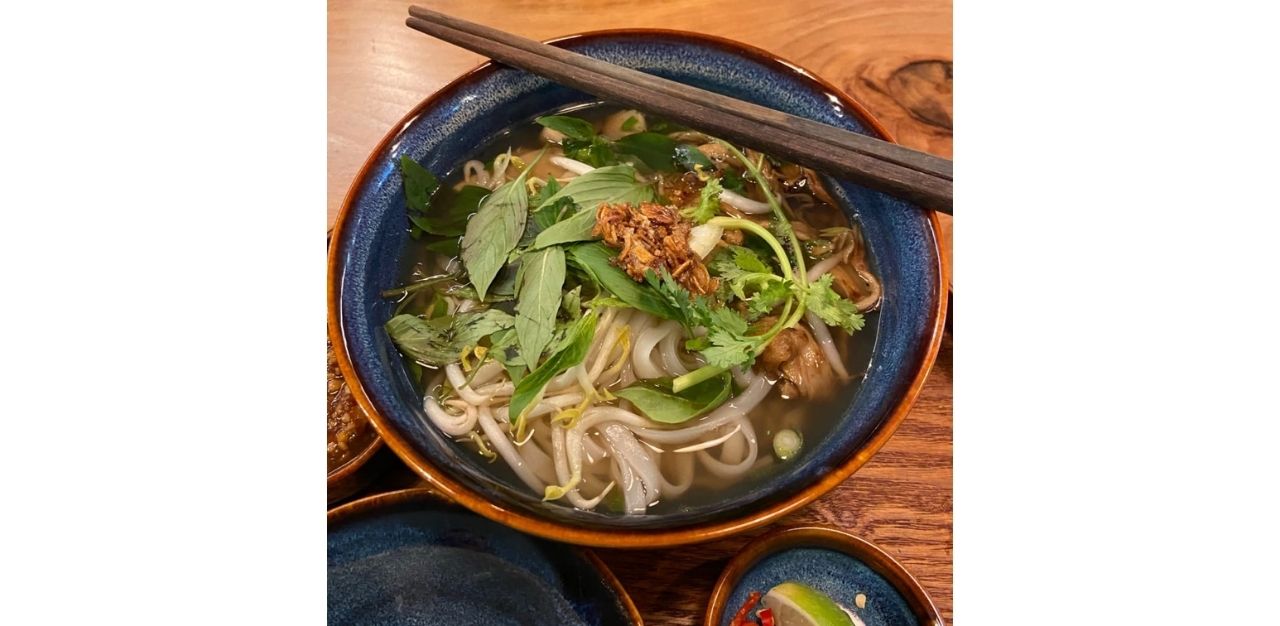
Attractions
1. Let’s Go Tour Singapore
Fancy a tour around Singapore? Why not do it on a bike, and learn about local biodiversity and Singapore’s sustainability sights while at it? Let’s Go Tour offers a large array of bike tours, cooking tours, boat tours, malay-speaking tours, and more.
History buffs should check out the Trails of Tan Ah Huat, telling the story of Singapore in the 1920s. Those who have always been curious about Singapore’s strive for water and energy security should check out the Water Story & Sustainability tour.
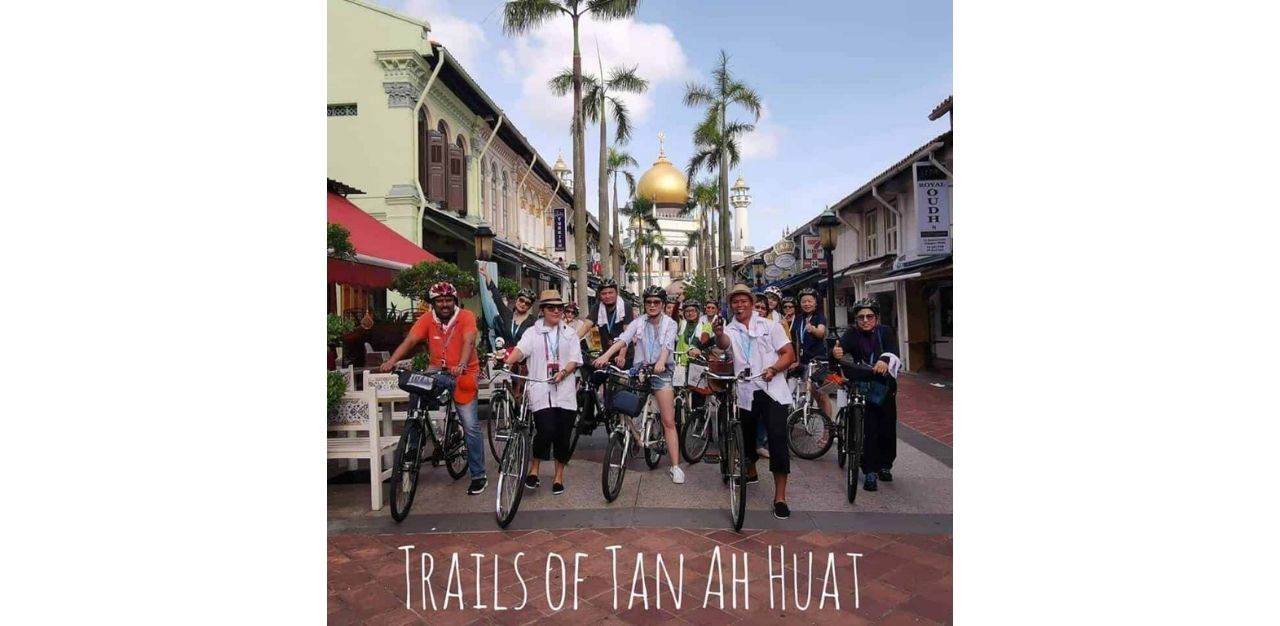
2. Untamed Paths
Contrary to popular belief, Singapore, with its robust conservation laws and stringent enforcement, is a stronghold for biodiversity in Southeast Asia. Having a tropical rainforest climate makes it a biodiversity hotspot, and the likes of flying lemurs, wild boars, sambar deers, and peregrine falcons are present in these parts of the woods — if one only knows where to look. Untamed Paths offers intertidal explorations, night adventures, and birdwatching tours that will help the nature-loving tourist do just that.

Join the conversations on TheHomeGround Asia’s Facebook and Instagram, and get the latest updates via Telegram.














